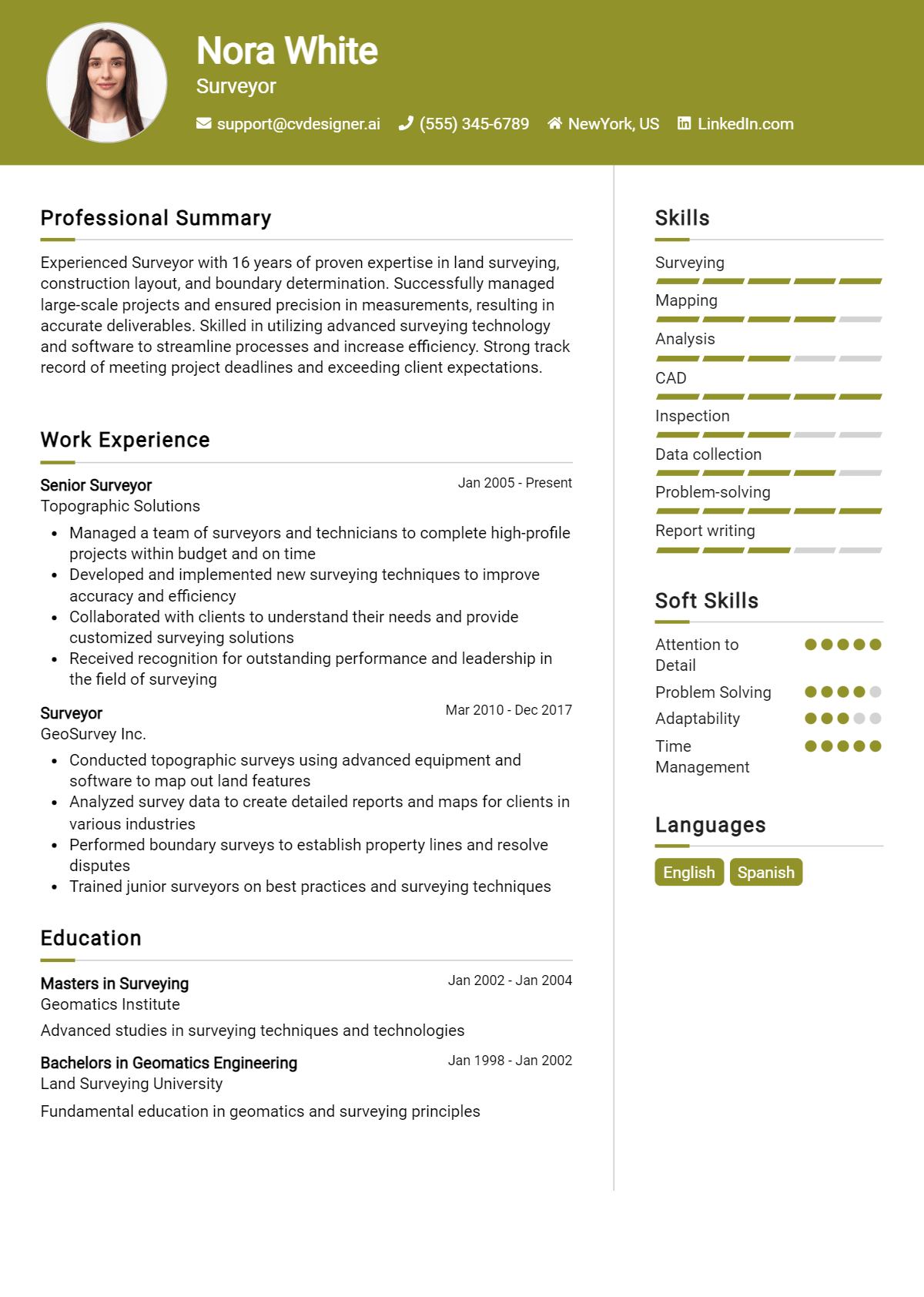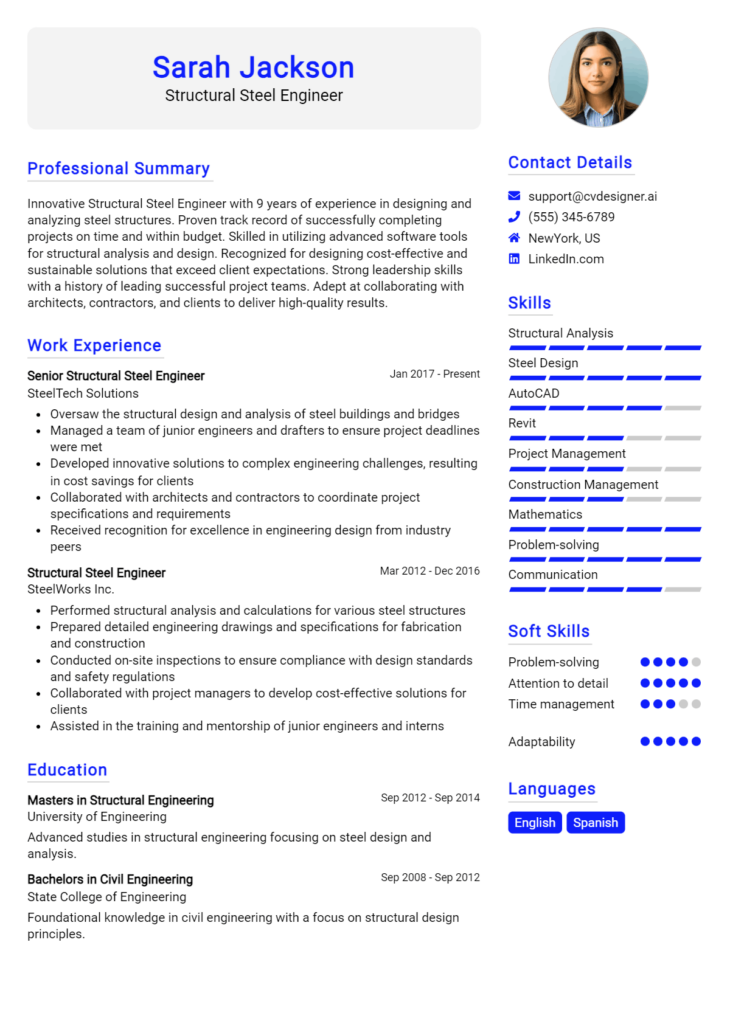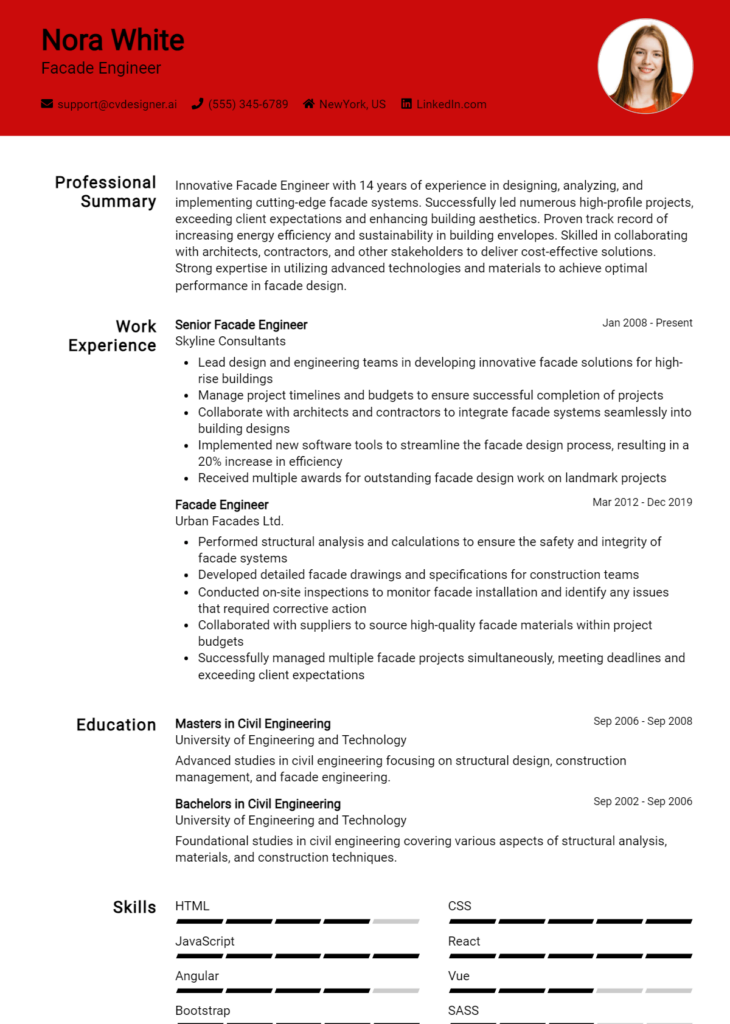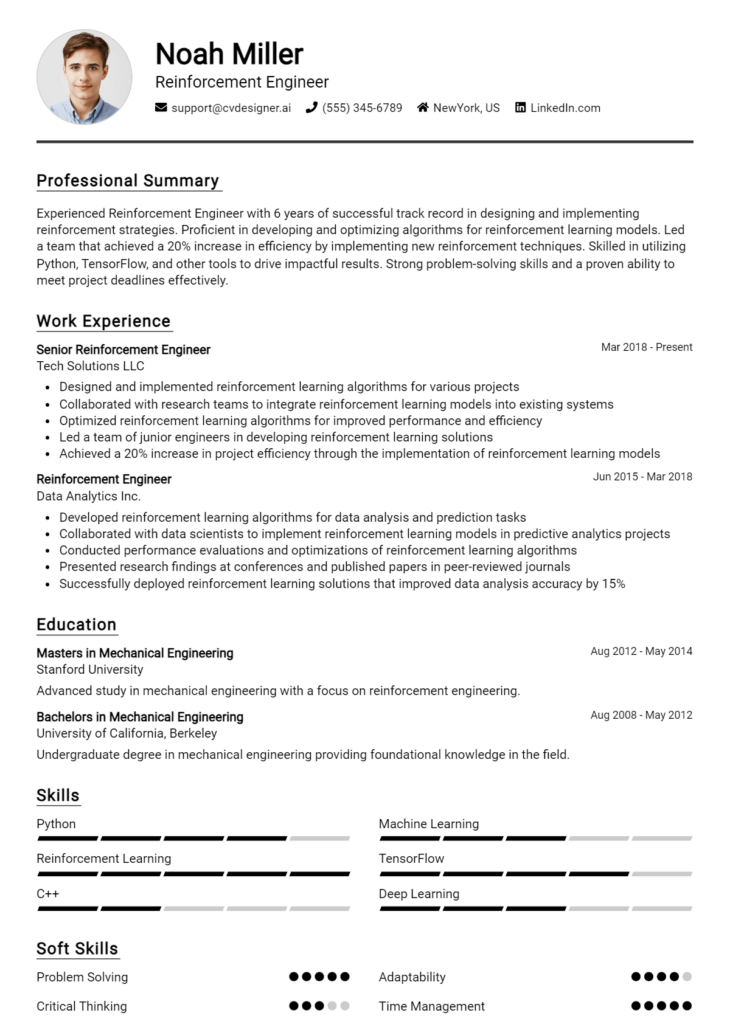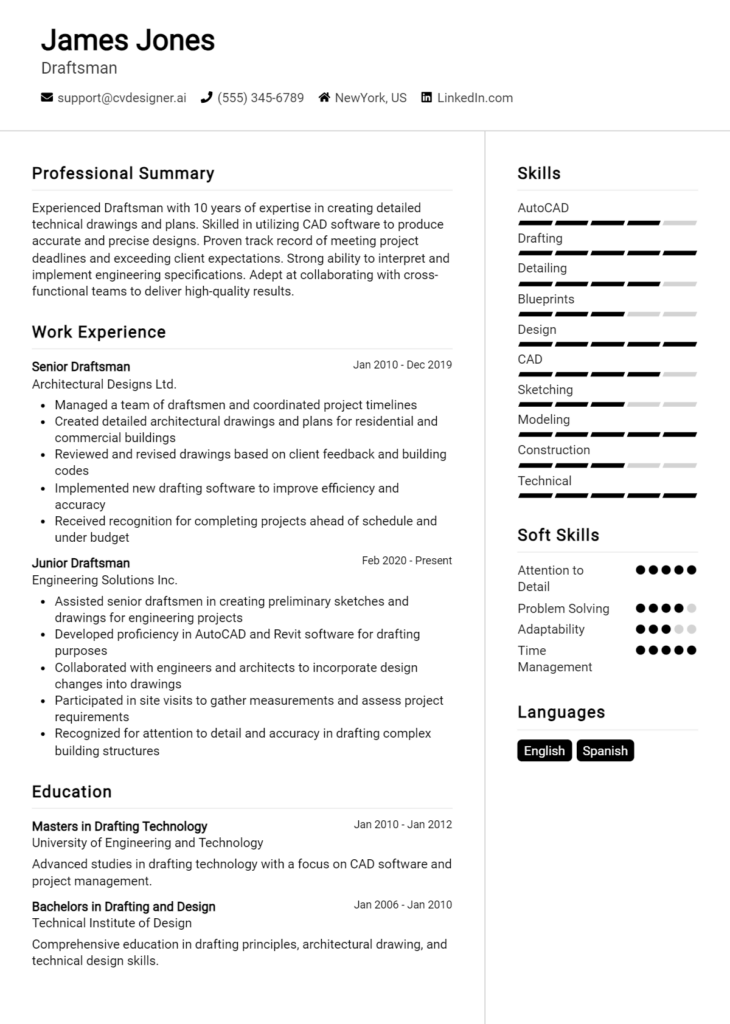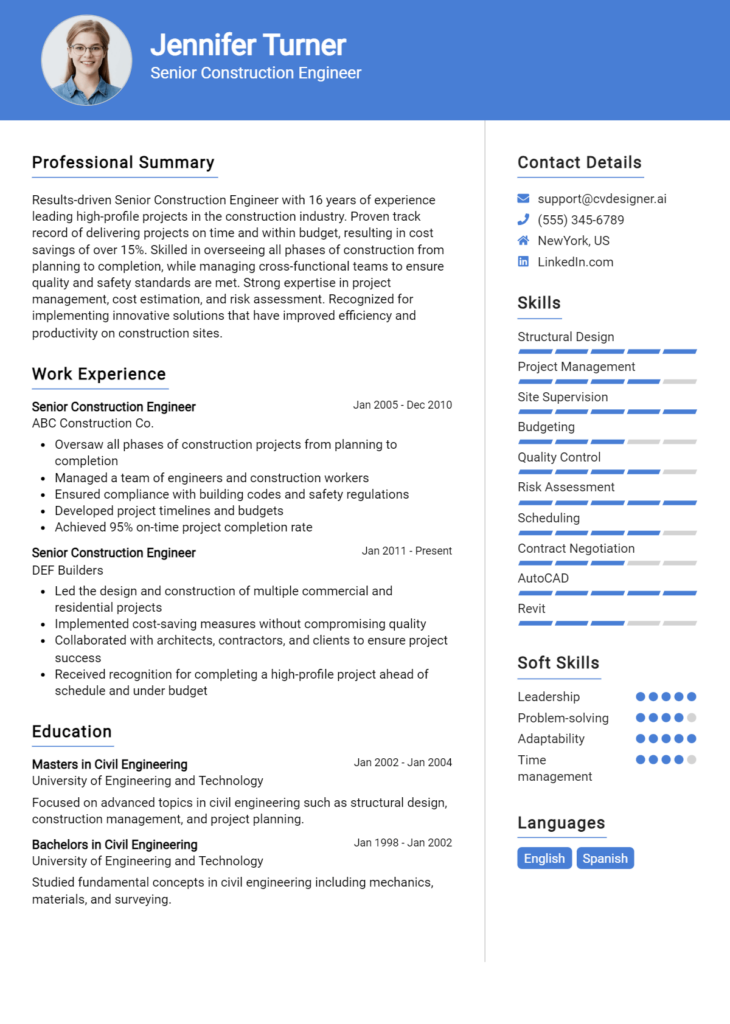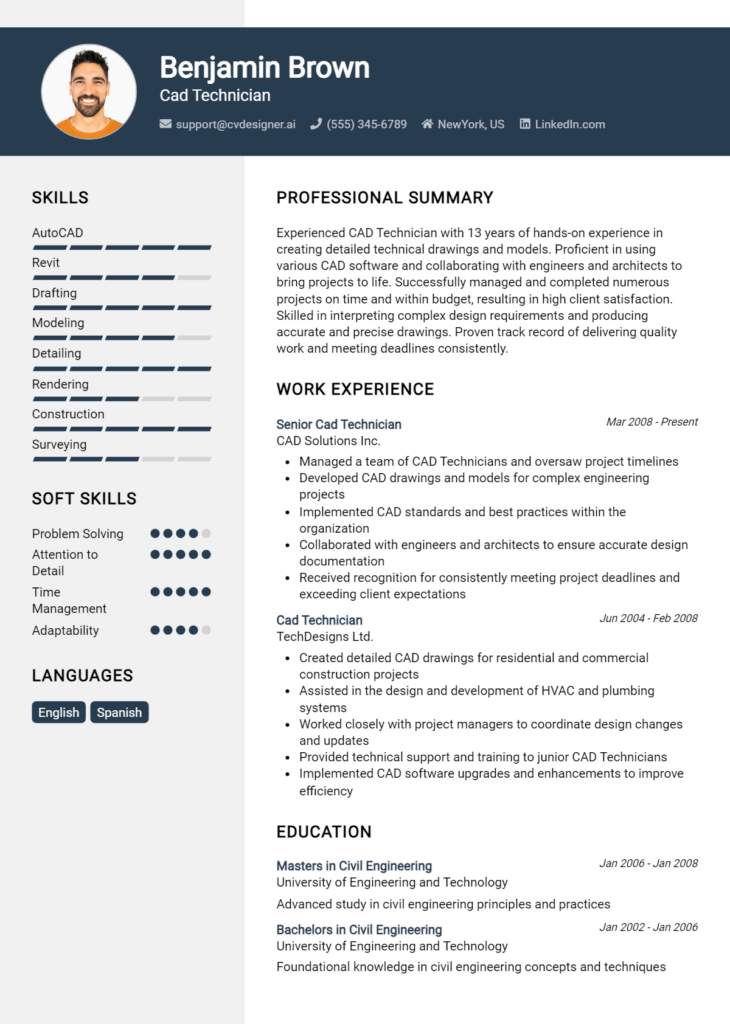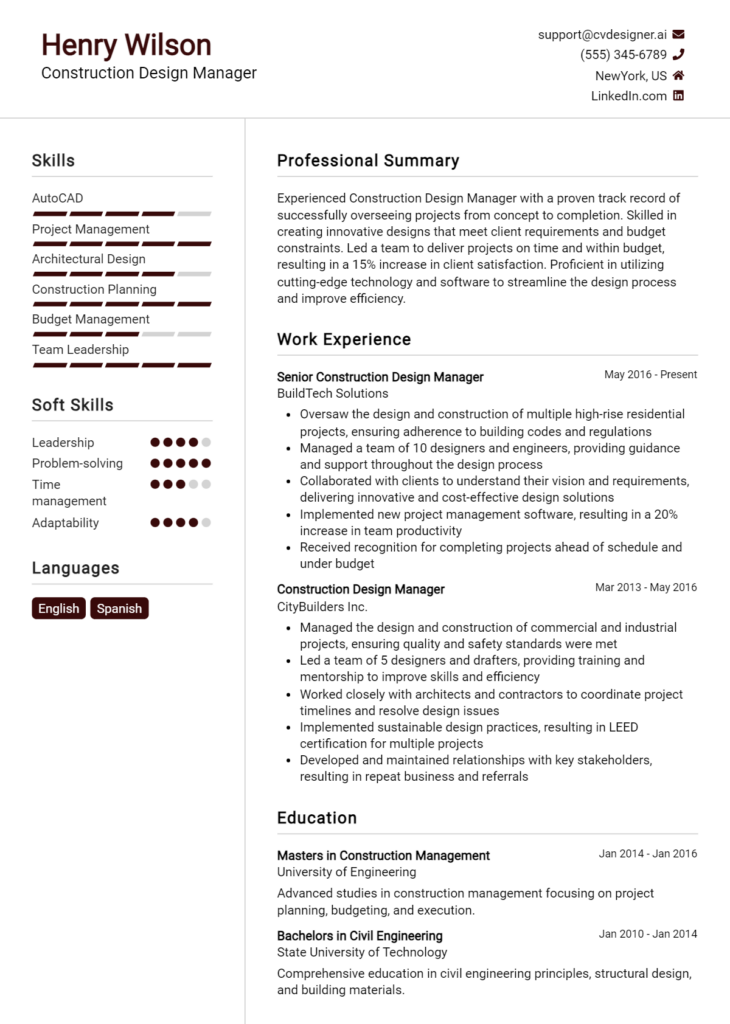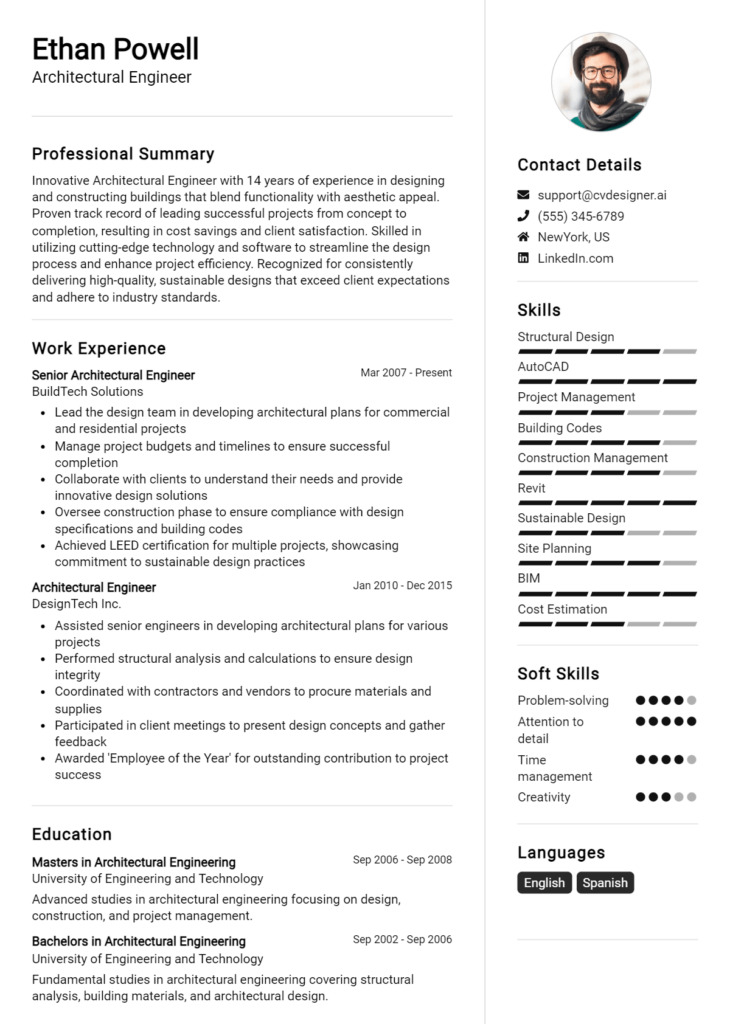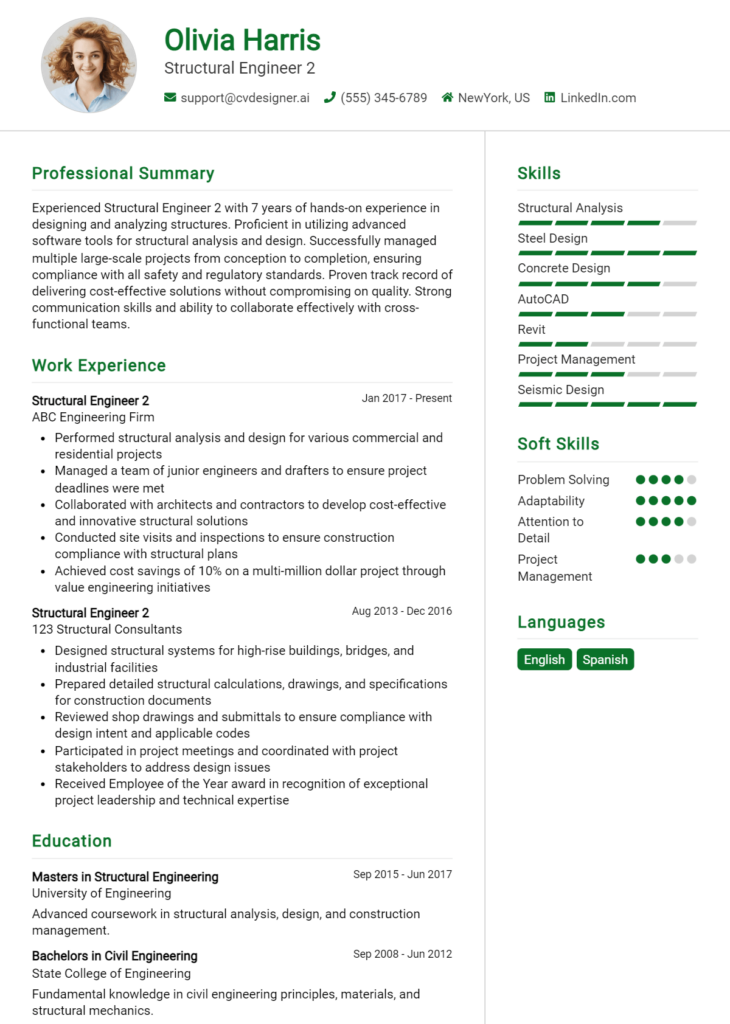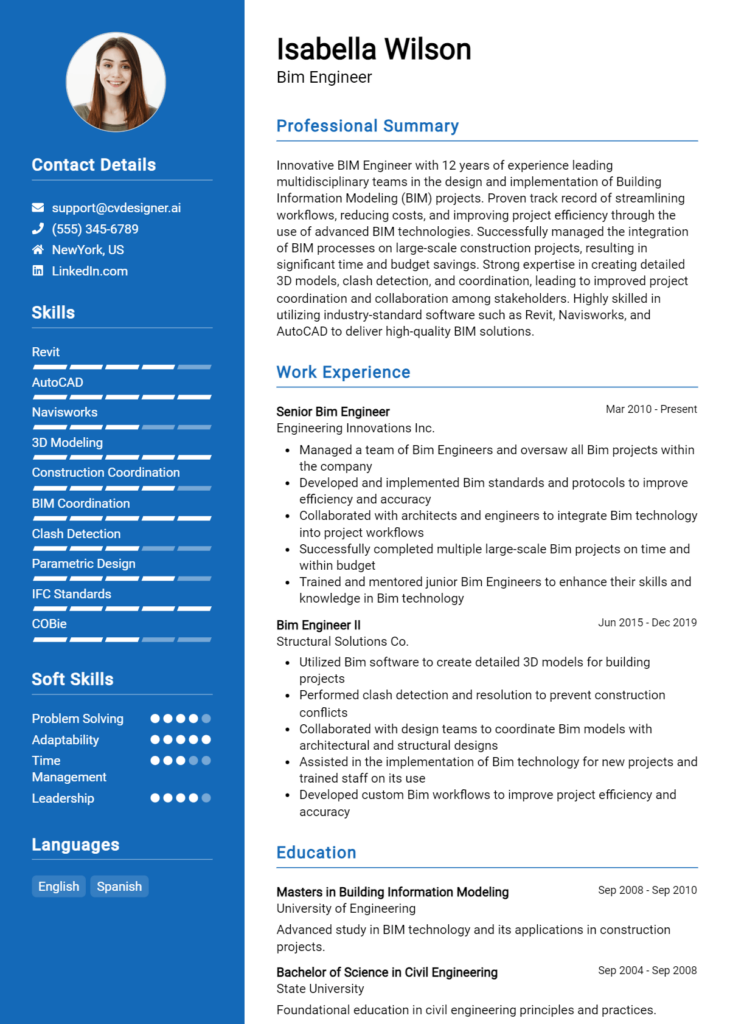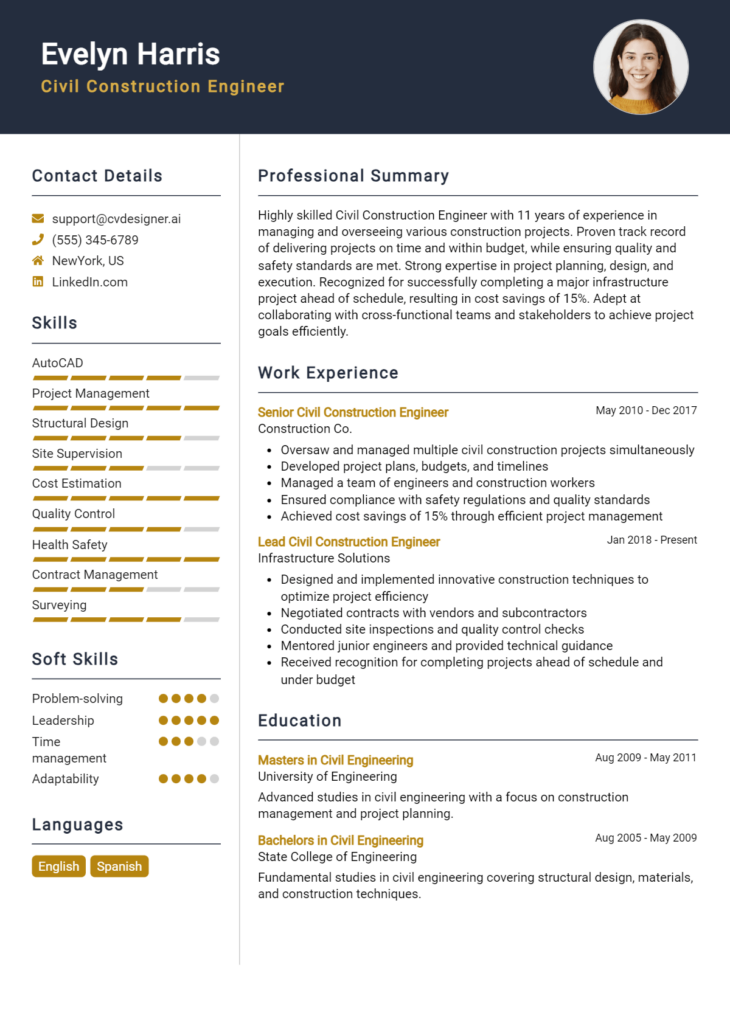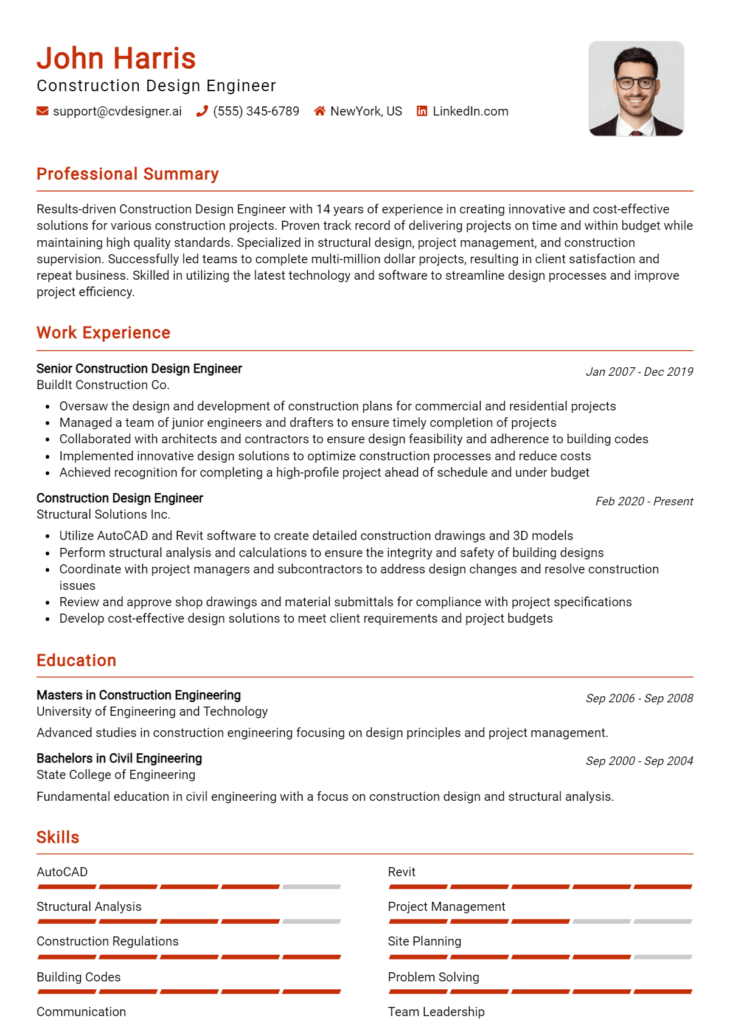Surveyor Core Responsibilities
A Surveyor plays a critical role in the planning and execution of land, construction, and project assessments, requiring a blend of technical expertise, operational insight, and exceptional problem-solving skills. They bridge various departments by collaborating with engineers, architects, and construction teams to ensure precise measurements and compliance with regulations. Proficiency in surveying equipment and software is essential for accurate data collection. A well-structured resume that highlights these abilities can significantly enhance an applicant's chance of success, aligning their qualifications with the organization's goals.
Common Responsibilities Listed on Surveyor Resume
- Conduct land surveys to determine boundaries and topography.
- Prepare and maintain accurate records and reports of survey data.
- Utilize GPS and other surveying equipment to collect data.
- Analyze survey data to develop maps and charts.
- Collaborate with engineers and architects on project design.
- Ensure compliance with local, state, and federal regulations.
- Provide recommendations based on survey findings.
- Manage project timelines and budgets effectively.
- Conduct research on historical property records.
- Monitor construction sites to ensure adherence to survey specifications.
- Train and supervise junior survey staff as needed.
High-Level Resume Tips for Surveyor Professionals
A well-crafted resume is crucial for Surveyor professionals, serving as the first impression a candidate makes on potential employers. In a competitive job market, your resume not only needs to highlight your technical skills and qualifications but also showcase your achievements in a way that resonates with hiring managers. An effective resume can set you apart from other candidates and open doors to exciting opportunities in the surveying field. This guide will provide practical and actionable resume tips specifically tailored for Surveyor professionals, helping you create a document that reflects your expertise and enhances your chances of success.
Top Resume Tips for Surveyor Professionals
- Tailor your resume for each job application by aligning your skills and experiences with the specific requirements listed in the job description.
- Highlight relevant surveying experience, including internships, volunteer work, and any specialized projects you have undertaken.
- Quantify your achievements where possible, such as the number of projects completed, the accuracy of your measurements, or improvements in efficiency.
- Include industry-specific skills like proficiency in surveying software (e.g., AutoCAD, Civil 3D) and knowledge of local zoning laws and regulations.
- Utilize action verbs in your descriptions to convey a sense of accomplishment and impact, such as "developed," "managed," or "analyzed."
- Incorporate certifications and licenses relevant to surveying, as these credentials can significantly enhance your qualifications.
- Keep your resume concise and focused, ideally fitting on one page while ensuring that the most relevant information stands out.
- Use clear headings and bullet points to improve readability and allow hiring managers to quickly find key details about your background.
- Consider adding a summary statement at the top of your resume that encapsulates your experience, skills, and career objectives in surveying.
By implementing these tips, you can create a standout resume that not only highlights your qualifications but also effectively communicates your value as a Surveyor. A well-structured resume tailored to the specific demands of the job can significantly increase your chances of landing an interview and ultimately securing a position in the surveying field.
Why Resume Headlines & Titles are Important for Surveyor
In the competitive field of surveying, a well-crafted resume headline or title serves as a critical first impression for potential employers. It encapsulates a candidate's core qualifications and professional identity in a succinct, impactful phrase that immediately grabs the attention of hiring managers. A strong headline not only positions the applicant favorably but also provides a snapshot of their relevant expertise, ensuring that the resume stands out amidst a sea of applicants. Therefore, creating a headline that is concise, relevant, and directly related to the specific surveying role being applied for is essential in effectively communicating a candidate’s value proposition.
Best Practices for Crafting Resume Headlines for Surveyor
- Keep it concise—limit to a few impactful words.
- Make it role-specific—include the job title you are applying for.
- Highlight key qualifications—focus on your most relevant skills and experiences.
- Use strong action words—emphasize achievements and contributions.
- Tailor it to the job description—align your headline with the employer's needs.
- Incorporate industry keywords—enhance visibility in applicant tracking systems.
- Showcase unique selling points—differentiate yourself from other candidates.
- Avoid jargon—use clear language that is easily understood.
Example Resume Headlines for Surveyor
Strong Resume Headlines
Licensed Surveyor with 10+ Years of Experience in Land Development
Detail-Oriented Surveyor Specializing in Geospatial Technology
Results-Driven Land Surveyor with Proven Track Record in Project Management
Certified Surveyor with Expertise in Boundary and Topographic Surveys
Weak Resume Headlines
Surveyor Looking for Job
Professional in Surveying
Experienced Worker in the Field of Surveying
Strong resume headlines are effective because they not only convey specific information about the candidate’s qualifications but also resonate with the needs of hiring managers searching for a particular skill set. They succinctly highlight the applicant's strengths, making a compelling case for why they should be considered for the position. In contrast, weak headlines lack clarity and specificity, failing to capture the essence of the candidate's experience or the value they bring to the role, ultimately reducing their chances of standing out in a competitive job market.
Writing an Exceptional Surveyor Resume Summary
A resume summary is a critical component of a surveyor's resume as it serves as a quick introduction to potential employers, highlighting the candidate's key skills, relevant experience, and notable accomplishments. A well-crafted summary captures the attention of hiring managers by providing a snapshot of what the candidate brings to the table, making it easier for them to assess fit for the role. This section should be concise and impactful, ideally tailored to reflect the specific requirements of the job being applied for, ensuring that it resonates with the hiring team and increases the chances of securing an interview.
Best Practices for Writing a Surveyor Resume Summary
- Quantify Achievements: Use numbers and metrics to showcase accomplishments, such as the size of projects managed or percentage improvements achieved.
- Focus on Relevant Skills: Highlight the most pertinent skills related to surveying, such as proficiency in GIS, CAD software, and data analysis.
- Tailor to the Job Description: Customize the summary to align with the specific job requirements and responsibilities listed in the job posting.
- Keep it Concise: Aim for 2-4 sentences that deliver maximum impact without overwhelming the reader.
- Use Action Verbs: Start sentences with dynamic verbs to convey a sense of proactivity and accomplishment.
- Showcase Certifications and Licenses: Mention any relevant certifications (e.g., LSIT, PLS) that enhance credibility and expertise.
- Highlight Industry Experience: Briefly mention experience in specific sectors, such as construction, land development, or environmental surveying.
- Emphasize Problem-Solving Skills: Illustrate how your skills have positively impacted projects or resolved challenges.
Example Surveyor Resume Summaries
Strong Resume Summaries
Detail-oriented surveyor with over 6 years of experience in land surveying and civil engineering projects. Successfully managed over 50 commercial site surveys, leading to a 20% reduction in project delivery time through efficient resource management and advanced GIS technology.
Licensed Professional Land Surveyor with a proven track record in boundary determination and construction staking. Achieved a 95% client satisfaction rate by delivering precise measurements and thorough project documentation on time and within budget.
Dedicated surveyor with expertise in topographic mapping and environmental assessments. Spearheaded a project that reduced surveying costs by 15% through innovative use of drone technology, leading to enhanced accuracy and efficiency.
Weak Resume Summaries
Experienced surveyor looking for new opportunities in the field. I have worked on various projects and have a good understanding of surveying techniques.
Surveyor with some experience in the industry. I am a team player and eager to contribute to a company’s success.
The examples of strong resume summaries demonstrate clarity, specificity, and quantifiable achievements, which are essential for making a memorable first impression. They effectively highlight relevant skills and experiences tailored to the role. Conversely, the weak summaries lack detail and measurable outcomes, making them generic and less compelling to potential employers. A strong summary conveys a clear value proposition, while a weak one may fail to capture the interest of hiring managers.
Work Experience Section for Surveyor Resume
The work experience section of a Surveyor resume is pivotal in demonstrating the candidate's technical skills and professional capabilities. This section not only highlights the specific surveying techniques and technologies employed but also showcases the candidate's ability to lead teams and deliver high-quality results on time and within budget. By quantifying achievements and aligning past experiences with industry standards, candidates can effectively illustrate their value to potential employers, making them stand out in a competitive job market.
Best Practices for Surveyor Work Experience
- Use specific terminology relevant to surveying to demonstrate technical expertise.
- Quantify achievements by including metrics such as project size, budget, and time saved.
- Highlight leadership roles and team collaboration to showcase management capabilities.
- Tailor your experience to align with job descriptions and industry standards.
- Include diverse surveying projects to illustrate versatility and adaptability.
- Focus on outcomes and impacts of your work rather than just tasks performed.
- Utilize action verbs to convey a sense of initiative and responsibility.
- Keep descriptions concise and relevant to the position being applied for.
Example Work Experiences for Surveyor
Strong Experiences
- Led a team of 5 surveyors in a $2M infrastructure project, completing the work 15% under budget and 2 weeks ahead of schedule.
- Implemented advanced GIS technology to enhance data accuracy, resulting in a 30% reduction in project turnaround time.
- Managed multiple surveying projects simultaneously, coordinating with civil engineering teams to ensure compliance with local regulations and standards.
- Designed and executed a comprehensive training program for junior surveyors, improving team productivity by 25% over six months.
Weak Experiences
- Worked on various surveying projects.
- Assisted in data collection and analysis.
- Participated in team meetings about surveying tasks.
- Helped complete projects without specific details or metrics.
The examples provided illustrate the difference between strong and weak experiences. Strong experiences are characterized by specific achievements, quantifiable results, and clear indications of leadership and collaboration, demonstrating a candidate's capability to contribute effectively to future projects. Conversely, weak experiences lack detail and measurable outcomes, making it difficult for employers to gauge the candidate's actual contributions and expertise in the field of surveying.
Education and Certifications Section for Surveyor Resume
The education and certifications section of a Surveyor resume is crucial as it underscores the candidate's academic background and demonstrates their commitment to professional development. This section provides potential employers with insight into the applicant's technical knowledge, specialized training, and adherence to industry standards. By listing relevant coursework, certifications, and continuous learning efforts, candidates can significantly enhance their credibility and show alignment with the specific requirements of the surveyor role. A well-structured education and certifications section not only reflects a solid foundation in surveying principles but also showcases a proactive approach to staying updated with the latest industry practices.
Best Practices for Surveyor Education and Certifications
- Prioritize relevant degrees such as a Bachelor’s in Surveying, Civil Engineering, or Geomatics.
- Include specific certifications, such as Professional Land Surveyor (PLS) or Surveying Technician certifications.
- Detail any specialized training in areas like Geographic Information Systems (GIS) or advanced surveying technology.
- List coursework that aligns with job descriptions, such as Topographic Surveying or Boundary Law.
- Highlight any ongoing education initiatives, such as workshops or seminars relevant to surveying.
- Ensure clarity and conciseness, avoiding unnecessary jargon while emphasizing key qualifications.
- Use bullet points for easy readability and logical organization of information.
- Tailor the section to reflect the specific job requirements of the position being applied for.
Example Education and Certifications for Surveyor
Strong Examples
- Bachelor of Science in Land Surveying, ABC University, 2020
- Certified Professional Land Surveyor (PLS), State Board of Professional Surveyors, 2021
- Advanced Geospatial Analysis Certification, XYZ Institute, 2022
- Coursework in Boundary Law and Survey Mathematics, ABC University
Weak Examples
- Associate Degree in General Studies, DEF College, 2018
- Certification in Basic Computer Skills, Online Course, 2019
- High School Diploma, GHI High School, 2016
- Outdated certification in Soil Testing, JKL Organization, 2015
The strong examples listed are considered effective because they directly relate to the skills and qualifications necessary for a surveyor role, showcasing relevant degrees and certifications that demonstrate expertise in the field. In contrast, the weak examples lack relevance and specificity to surveying, with general qualifications that do not contribute to the candidate's professional credibility in this specialized area. These distinctions emphasize the importance of tailoring educational backgrounds and certifications to the specific demands of the job market in surveying.
Top Skills & Keywords for Surveyor Resume
A well-crafted resume is essential for any Surveyor looking to stand out in a competitive job market. Highlighting the right skills can make a significant difference in showcasing your qualifications and attracting the attention of potential employers. A Surveyor's role demands a blend of technical expertise and interpersonal abilities, making it critical to effectively communicate both hard and soft skills. By carefully selecting and presenting these skills, you can demonstrate your capability to conduct precise measurements, manage projects, and collaborate with various stakeholders. For more information on how to enhance your resume with the right skills, feel free to explore our skills guide.
Top Hard & Soft Skills for Surveyor
Soft Skills
- Attention to Detail
- Communication Skills
- Problem-Solving
- Time Management
- Team Collaboration
- Adaptability
- Critical Thinking
- Client Relations
- Negotiation Skills
- Project Management
Hard Skills
- Land Surveying Techniques
- Geographic Information Systems (GIS)
- AutoCAD Proficiency
- Data Analysis
- Legal Knowledge of Property and Surveying Laws
- Use of Surveying Equipment (Total Stations, GPS)
- Mapping and Charting
- Construction Site Management
- Technical Report Writing
- Survey Data Interpretation
By focusing on these essential skills in your resume, you not only highlight your expertise but also demonstrate your readiness for the demands of the Surveyor position. Additionally, showcasing relevant work experience can further reinforce your qualifications and readiness for the job.
Stand Out with a Winning Surveyor Cover Letter
I am writing to express my interest in the Surveyor position at [Company Name] as advertised on [Job Board or Company Website]. With a comprehensive background in land surveying, project management, and a commitment to delivering precise and reliable results, I am excited about the opportunity to contribute to your team. My experience with both traditional and modern surveying techniques, combined with my proficiency in the latest surveying software, positions me well to excel in this role.
In my previous role at [Previous Company Name], I successfully led a variety of surveying projects, including boundary surveys, topographic surveys, and construction staking. I take pride in my meticulous attention to detail and my ability to interpret complex blueprints and legal descriptions. Additionally, my strong communication skills have allowed me to collaborate effectively with engineers, architects, and clients, ensuring that all project specifications are met on time and within budget. I am adept at using advanced surveying instruments and technologies, which has enabled me to enhance the accuracy and efficiency of my work.
I am particularly drawn to [Company Name] due to its reputation for innovation and commitment to excellence in the surveying field. I am eager to bring my expertise in land surveying and my proactive approach to problem-solving to your esteemed company. I am confident that my strong work ethic and dedication to high-quality results will make a significant contribution to your ongoing projects and overall success.
Thank you for considering my application. I look forward to the opportunity to discuss how my skills and experiences align with the needs of your team. I am excited about the possibility of contributing to [Company Name] and am available for an interview at your earliest convenience.
Common Mistakes to Avoid in a Surveyor Resume
Crafting a compelling resume as a surveyor is crucial for standing out in a competitive job market. However, many applicants make common mistakes that can hinder their chances of landing an interview. By avoiding these pitfalls, surveyors can present a more polished and professional image to potential employers. Here are some frequent errors to watch out for:
Neglecting to Tailor the Resume: Using a generic resume for multiple job applications fails to highlight relevant skills and experience specific to the job description, making it less appealing to hiring managers.
Overloading with Technical Jargon: While technical knowledge is essential, using excessive jargon without context can alienate non-technical HR personnel who may be involved in the initial screening process.
Ignoring Formatting Consistency: Inconsistent formatting, such as varying font sizes and styles, can make the resume look unprofessional and difficult to read, detracting from the content.
Failing to Showcase Relevant Experience: Omitting significant project experience or achievements that demonstrate surveying skills can lead to a lack of interest from employers. It’s vital to highlight accomplishments that align with the job requirements.
Including Irrelevant Information: Adding unrelated work experience or outdated skills can clutter the resume, diverting attention away from the most pertinent qualifications for the surveying role.
Using Passive Language: Passive phrases can undermine the impact of your achievements. Instead, use active language that conveys responsibility and results, such as “led a team” or “completed projects.”
Not Proofreading for Errors: Spelling and grammatical mistakes can create a negative impression and suggest a lack of attention to detail, which is critical in surveying work.
Omitting Soft Skills: While technical expertise is vital, failing to mention soft skills like communication, teamwork, and problem-solving can leave out essential qualities that employers seek in a surveyor.
Conclusion
As a surveyor, your role is critical in ensuring accurate measurements and assessments for various projects, including construction, land development, and environmental studies. Throughout this article, we explored the essential skills required for surveyors, such as proficiency in using surveying equipment, knowledge of geographical information systems (GIS), and a solid understanding of land laws and regulations. We also highlighted the importance of effective communication skills, as surveyors often collaborate with engineers, architects, and clients.
Furthermore, we discussed the various specializations within surveying, including land surveying, marine surveying, and geodetic surveying, each requiring a unique set of skills and knowledge. Emphasizing continuous learning and adaptation to new technologies was also a key point, as the field of surveying is rapidly evolving with advancements in technology.
To ensure you stand out in this competitive field, it's crucial to have a polished and professional surveyor resume. We encourage you to take the time to review and update your resume to reflect your skills and experiences accurately. Consider utilizing available resources such as resume templates, a user-friendly resume builder, tailored resume examples, and comprehensive cover letter templates. These tools can help you create a standout application that truly represents your expertise and readiness for your next opportunity in the surveying field.

